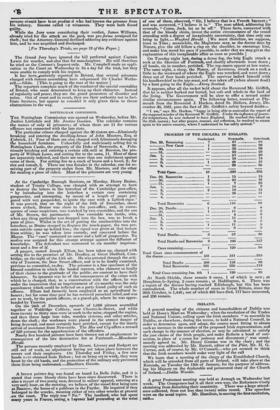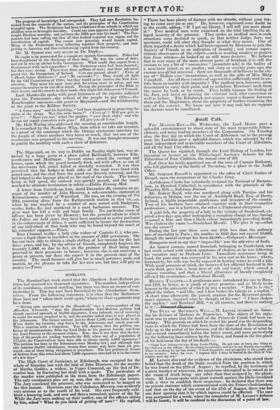IRELAND.
A general meeting of the citizens and householders of Dublin was held at Hone's Mart on Wednesday; when the resolution of the Trades and National Unions, calling upon the Irish members "to assemble in Dublin, or elsewhere, during the recess, to hold a National Council, in order to determine upon, and adopt, the course most fitting to obtain such an increase in the number of the proposed Irish representation, and such change in the manner of election, as may be calculated to satisfy the just claims of the Irish people, and make Reform a bond of con- nexion, in place of a cause for jealousy and discontent ;" was unani- mously agreed to. Mr. Henry Grattan was in the chair ; and the meeting was addressed by Mr. Barrett, editor of the Pilot, Mr. H. G. Curran, and, of course, by Mr. 0' Connell,—who yet seemed to think that the Irish members would make very light of the call
We learn that a meeting of the clergy of the Established Church, which will be attended from all parts of Ireland, will take place at the Rotunda, on Tuesday the 13th of January, for the purpose of address- ing his Majesty on the deplorable and persecuted state of the Church of Ireland.—Dublin Warder.
A great Protestant meeting was held at Armagh on Wednesday last week. The Orangemen had it all their own way, the Reformers wisely abstaining from disturbing their unanimity. There was a 'Urge attend- ance collected, from not less than twenty miles round. The speeches were on the usual topics. Mr. Hamilton, in moving the first resolution, said-
The progress of knowledge had retrograded. They had seen Revelation ba- nished from the councils of the nation, and the principles of the Constitution trampled upon. . The Scriptures had been withdrawn from schools in which our children were to be taught morality. . Could anyman approve of having his child taught Heathen morality, and not have the Bible put into his hand? The Eco- nomists had been calling out that all that Ireland required was repose and the introduction of capital. The course now pursuing would banish capital. Many of the Protestants were collecting together their property, and emi- grating to America, and thus withdrawing capital from the country.
Mr. M. Symiot was very severe or. Dr. Doyle— He ought to be prosecuted for a conspiracy against Government. Police had been slaughtered in the discharge of their duty. He was the cause of that; and yet he was an adviser to the Government. What could they expect from a Government with such counsellors ? The Protestant cause had been deserted ; but they were strong. There were three • millions of men; and their 'advanced guard was the Orangemen of Ireland. Were any present afraid ? ( Cries of "Death before dishonour !" and " No surrender t") They would all fight for the Old Constitution of 1788; but they would never receive the New Con- stitution. They must hit upon some plan for acting more in union, and not expose themselves to be cut off in detail. Having the principles of the Bible in -their hearts, and the swords in their hands, they Might bid defiance to O'Connell.
Lord Mandeville spoke with great bitterness of the injuries inflicted Epon the Protestants—the refusal of the people to pay tithes—the Knocktopher massacre—the grant to Maynooth—and the withdrawing of the grant to the Kildare Society.
" A dozen men," said his Lordship, "had been slaughtered in protecting the rights of the clergy. Was this to be borne?" (cries of " Will you give us guns?") "Have you not," asked the speaker, "your clock clubs.? and why do you not supply yourselve's with guns ? I'll give you all I can." Mr. Holt Waring also addressed the meeting at considerable length. It is remarked by the Northern Whig, from which we take our account, as a proof of the contempt which the Orange aristocrats entertain for the people of whose numbers they boast so much, that not one of the resolutions was proposed to the meeting. It was not thought necessary to gratify the mobility with such a show of deference.
The Sligo mail, on its way to Dublin on Sunday night last, was at- tacked by a large party at a place called Ballinakill, between Edg- wonhstown and Mullingar. Several stones struck the carriage and horses, upon which the guard instantly fired, and with effect, as one of the miscreants fell, either killed or mortally wounded. It was then
perceived that the hedges at both sides of the road were lined with armed men, and the shot from the guard was directly returned, and the ball lodged in the luggage placed on the roof of the coach. The horses being at full speed, the ambush was quickly passed, and the coach reached its ultimate destination in safety.—Dublin Evening Mail.
A letter from Carrick-on- Suir, dated December 30, contains an ac- count of the murder of John Henessy, a sub-constable, stationed at Kilmacthomas, county of Waterford. He was, on the evening of tt'e 29th, returning alone from the Rathgormick station in that when he was waylaid by a number of men armed with bludgeons, spades, forks, gm. and murdered in a most barbarous manner. The poor man has left a wife and large family. No particular cause of offence has been given by Henessy ; but the general odium in which the Police are held since they have been employed as active partisans
in the enforcement of tithes. is quite sufficient to insure the destruction of any individual of that body who may be found beyond the reach of his comrades' support—Times.
Near Clonmel resides a lady (the widow of Captain C.), who pos- sesses a legal claim to lay tithes to the amount of 500/. per annum. She has not been able to obtain a single shilling of her income for the last three years and has, by the advice of friends, completely forgiven the tenantry 1400/. so due to her, on the promise of their being more
punctual in their payments in future ; however, she is not receiving a penny at present, nor does she expect it in the present state of the country. The small farmers will give her as much potatoes, pork, and mutton, as she pleases to take for her own use, but they will pay no money !— Times.































 Previous page
Previous page